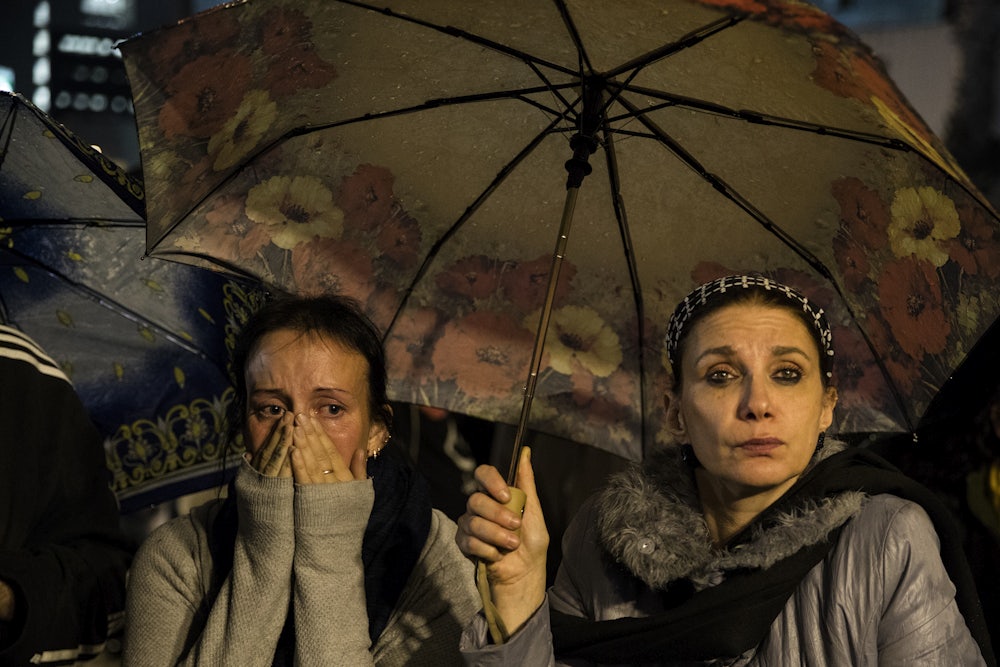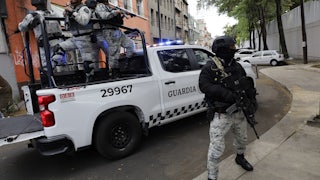My cousin’s husband here in Tel Aviv swore not to cut his beard or his hair until the Israeli hostages were released, but after 107 days, he succumbed. The horrific situation of the captives has left Israelis in despair, not knowing what they can do to change the ugly facts, but desperate to express solidarity with families whose hearts are broken. There may be a deal soon, and then, the despair will turn to shock as too many hostages return dead, but at least there will be a chance for families to heal, for communities to move on.
Each morning, the news begins with announcements of soldiers dead or injured. The news does not include the civilian deaths in Gaza, and there is minimal coverage of the humanitarian disaster there, though it is all readily available on CNN or other international newscasts. Similarly, it must be said that when I visited the West Bank, Palestinians there knew little of the situation of the hostages or details of the October 7 atrocities. While Israeli Jews watch their own news channels, Palestinians watch Al Jazeera. (Arab citizens of Israel often watch Al Jazeera too.)
One advantage I have as an American is the ability to drive in and out of Ramallah, or any of the areas controlled by the Palestinian Authority, which Israeli citizens are not allowed to do. When I visited Palestinian pollster Khalil Shikaki in Ramallah, he told me: “In the West Bank, less than 10 percent saw the videos of atrocities. Twenty-five percent of Gazans did. If you look at the impact of seeing the videos, the impact is dramatic. Just like the Israelis don’t see civilians killed every single hour on their TVs as Palestinians do. They live in a completely different world.
“After war things will start to change, of course, and people will be more exposed and see other things. But not during war. The international media is usually seen by a very small percentage, so we’re talking about 5 percent maybe of the Palestinians, of all Palestinians, 5 percent are likely to see CNN or BBC or some other alternatives. In this environment, the narratives will diverge completely from reality for both sides.… This is unfortunate, but it doesn’t really reflect the essence of the two peoples … who have been through a dramatic event. The Israelis are still living October 7 every day. And Palestinians live October 7 every day because it is every day to them.… You say, well, who’s doing this to us, they can’t be human, they can’t be like us, and the Israelis are doing exactly the same—[that] those who are supporting Hamas, they can’t be human they can’t be like us. They must have a different value system. And this is not crazy people who are saying that. These are people that you and I know very well. They are our friends, on both sides. And the day before October 7, they were rational people. Now they are completely dehumanizing the other side. And we’ll continue to do so until this is over.”
Every Saturday night in Israel, there are protests demanding that the hostages come home—really a demand to the Netanyahu government to make the hostages’ return a priority, which many here in Israel believe not to be the case. Now, finally, there appear to be robust negotiations led by the Biden team.
“Hostage Square” is the concrete gathering space, in front of the Tel Aviv Museum, that has been transformed by activists and artists into a cacophony of expression, as if people’s hearts have been turned inside out and a giant communal scream lives on the square 24/7 with tents populated by hostage families, art installations, and gathering places. In the last couple of weeks, the Saturday night demonstrations held here are joined by a parallel and more political demonstration, with explicit calls for Netanyahu to resign, along with increased police violence against protesters who seek to shut down main thoroughfares.
It is only a matter of time before the protests start swelling again as they did for 10 months against the antidemocratic aims of the Netanyahu government. Many hope that Benny Gantz, leader of a centrist party and former head of the Israel Defense Forces, who has made few political statements, can form a coalition without the Likud or the settler right wing when Israel finally holds new elections. Meanwhile, the hard-core right-wing settlers of the current government keep pulling Netanyahu, and Israel, toward the abyss. This past week, no fewer than 11 government ministers danced at a far-right gathering in Jerusalem promoting Jewish messianic return to Gaza.
It is pretty much impossible to talk about a two-state solution at the moment among traumatized Israelis. But it is necessary. Rami Hod, director of the social democratic Zionist Israeli think tank the Berl Katznelson Foundation, puts it this way: “The crazy attempt to establish settlements in Gaza will not be determined by the strength of the religious-settler right but by how the Israeli mainstream will respond to it.” He rightly argues that while the liberal majority here “engage in hundreds of volunteer initiatives to fill the gap left by the government [who have failed to support the population’s needs during wartime] and seek out unity in dialogues with those to their right,” the actual right-wing settler movement is organizing and promoting a plan that “will sink us and our children in the mud. They will drag us all into the abyss. The only question that matters is whether, this time, we will be smart enough to stand against them.… If we understand that the only reason that the settler right has gained such power over the years is a long-standing political coma of the opposing camp and that [through] the continuation of politicization that began with the Kaplan protest [as the massive pro-democracy movement became known, for the main street in Tel Aviv where people gathered] and expanded also to the political security struggle for the future of the territories, in order to create a secure border to Israel, we have a chance to stop them.”
One thing I didn’t expect to feel during this current visit to Israel was calm. But I felt it the second I landed—sad, even depressed, but calm. For two weeks, I escaped from the vitriol in the American streets, the canceling of friends online, the arguments about Israel’s right to exist. No one is paying attention to any of the statements or protests, except for whatever President Biden and his advisers say. No other voices matters.
I was sitting with a friend of mine in a café in Jaffa when he told me that the difference between all of the lefty noise outside of Israel is that over “there,” Israel is a “cause,” but here, “it’s our life.” And almost on cue, as he said this, my phone alarm went crazy. It was the “Red Alert” app, telling us that there were incoming rockets from Hamas aimed at Tel Aviv. There were 11 rockets, in fact aimed at the Tel Aviv metropolitan area, Israel’s most densely populated region. Everyone fled the café, leaving coffee cups and a chess board. We ran out to a safe place—to the stairwell of my friend’s apartment building across the street, while waiting to hear a very loud boom, which was the sound of the Iron Dome breaking apart the missiles. Then, as instructed, we waited another 10 minutes, ensuring we weren’t in the line of ricocheting pieces of missiles, until we returned to the café. I couldn’t help thinking that if there were no Iron Dome—and therefore massive Israeli civilian casualties—perhaps there would be more sympathy among the American left or, at least, less enthusiasm for Hamas.
Last weekend, I drove north to spend time with my cousins, who live in a seaside community 9.5 kilometers from the Lebanese border, today fortified with sandbags, locked entrances, and military guard. They are just south of where Israel has ordered 28 communities to evacuate to hotels in the center of the country. The international news is giving less coverage to the truly dangerous situation for Israelis in the north, as Hezbollah continues to lob rockets into civilian communities.
By the time I hit Haifa, heading north on the highway, my GPS stopped; I had no Waze (an Israeli invention) to tell me where to go as the IDF jammed the sky to confuse the Hezbollah fighters. Luckily, I knew where to go, having driven these roads countless times. Yet it was a too-convenient metaphor for where Israel is at the moment—a country without navigation, driving blindly by memory.






